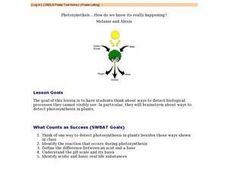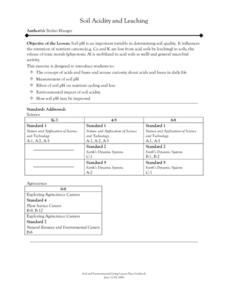Curated OER
The Acid Test
Students prepare a test solution whose color changes when an acid or a base is added. They determine whether various household substances are acids or bases and look for patterns in the results. Students determine how their test solution...
Teach Engineering
Basically Acids
Base your lesson plan on acids and bases on an informative resource. The first installment of a five-part module on the science behind Harry Potter has individuals investigate acid/base chemistry with the use of invisible inks. They also...
Curated OER
Photosynethsis....How do we know it's really happening? - Biology Teaching Thesis
Young scholars think of one way to detect photosynthesis in plants besides those ways shown in class. They identify the reaction that occurs during photosynthesis. Students define the difference between an acid and a base. They identify...
Kenan Fellows
Industrial Knowledge of Acids and Bases
Over a 10-year period, EPA regulations cost businesses less than $30 billion, while businesses saved over $82 billion. Scholars experiment with acids and bases to better understand the pH scale. Then they debate environmental regulation...
Curated OER
Soil Acidity and Leaching
Students are introduced to the concept of acids and bases and arouse curiosity about acids and bases in daily life. They are introduced to the measurement of soil pH. Pupils are introduced to the effect of soil pH on nutrient cycling...
DiscoverE
Everyday Engineering: Colorful Chemistry
Watch red cabbage juice turn green. Pupils first watch a video that takes them through the process of creating red cabbage juice. They then add various solids and liquids to the juice and use the color change to determine whether the...
American Chemical Society
Using Chemical Change to Identify an Unknown
If you discover an unknown powder, how do you determine if it is safe? Lesson uses four different tests to identify the properties of various powders that appear the same. Then scholars get an unknown powder and have to determine which...
Curated OER
Not So Neutral Views
Students explore ways to use indicators to distinguish between acids and bases. They conduct an experiment to model and discuss the harmful effect of acid rain in our living and non-living environment.
University of Georgia
Antacid and Uncle Heartburn
Household materials can be used for more than cleaning! In this collaborative experiment, emerging chemists use products such as vinegar and liquid antacid to explore chemical reactions that commonly occur in the human body.
Curated OER
High-Tech Food: Science in Your Shopping Cart
Kids are given a lot to think about, as they delve into the world of high-tech foods. They discuss GMOs, biotechnology, food enhancements and domestication. They view videos, engage in class discussions, complete worksheets, and learn...
Curated OER
DNA: Expressions in Agriculture
What is DNA extraction, and can you make a living doing it? Yes, if you are in a biotechnology field. Kids learn about DNA extraction, GMOs, and biotechnology careers. They then watch videos and complete activities to understand the use...
Curated OER
Household Chemistry
Students use indicator paper to determine if substances are acidic, basic, or neutral. They test for Ph levels in them. They investigate the effect of oxygen on darkening fruit cut and exposed to the air. They observe vitamin C as an...
Kenan Fellows
Qualitative Kinetics: Examining the Effect of an Enzyme on a Reaction
Scholars learn about kinetics and buffers as they use qualitative and quantitative methods to understand enzyme rates and buffer capacity. The application of Beer's Law and spectrophotometry solidifies pupils' knowledge in the first of...
Howard Hughes Medical Institute
Zebrafish and Skin Color
You may not know if that zebrafish in your fish tank is a model citizen—but it is definitely a model organism! What can we learn about ourselves from a tiny zebrafish? Discover more about the polygenic trait of skin color through a...













